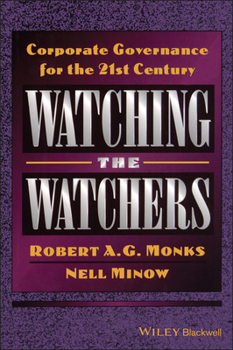Watching the Watchers: Corporate Goverance for the 21st Century
Select Format
Select Condition 
Book Overview
Every day, companies are faced with dozens, even hundreds, of critical decisions concerning the allocation of resources, financial and organizational structure, and strategic direction. Who should make these decisions? And who should be held accountable for their consequences? Boards of directors are the "watchers" who govern the destinies of today's corporations, and Robert Monks and Nell Minow have been watching over their actions for years. This book was written for the people who need to know the most about corporate governance--directors, managers, shareholders, anyone in business--by the people who may know the most about doing it right.
Watching the Watchers: Corporate Governance for the 21st Century covers everything modern-day managers need to know about corporate governance. Monks and Minow examine what a corporation is and how to measure its performance. In separate chapters on the rights and responsibilities of shareholders, boards of directors, managers, and employees, the authors examine the roles that each of these "corporate constituents" can, do, and should play in determining corporate direction and strategy. And they conclude with recommendations for increasing the productivity and competitiveness of corporations by strengthening the shareholders and the board--the "watchers." Their real-world experiences, insights, and instructions are of critical importance to anyone concerned with the direction of business in our time.





